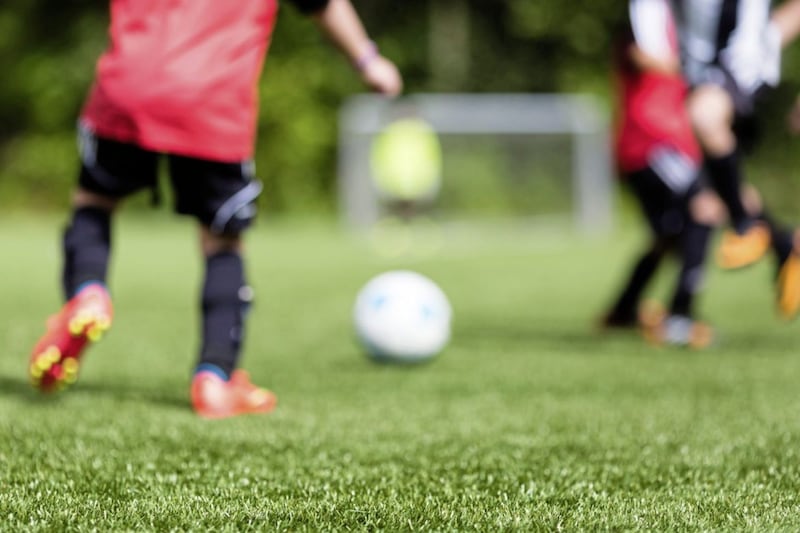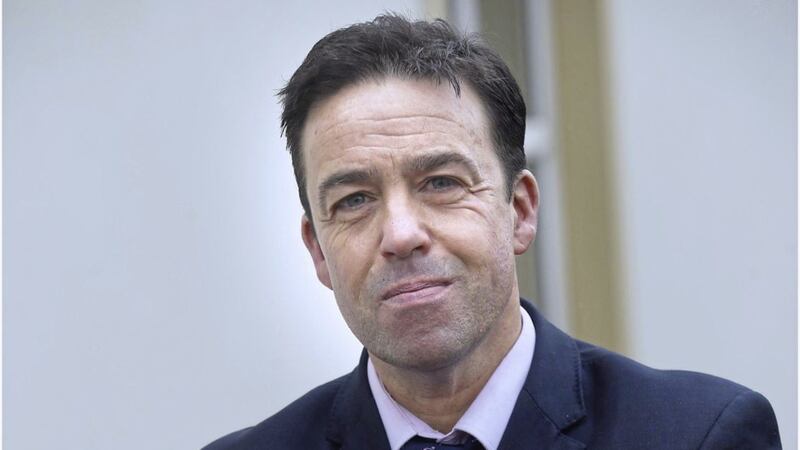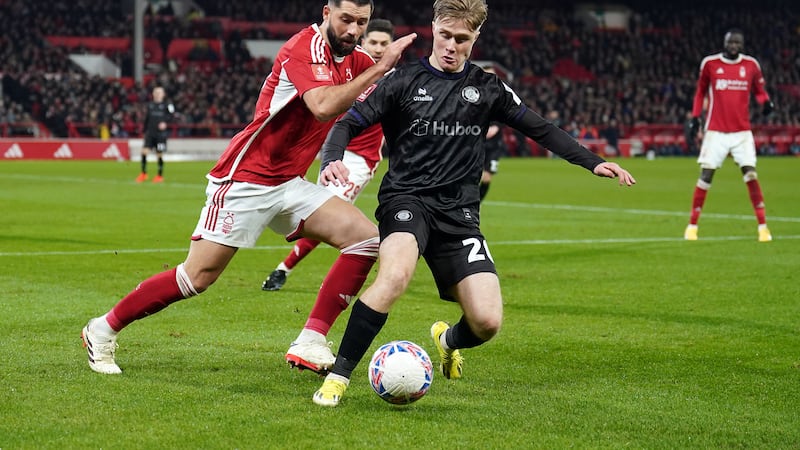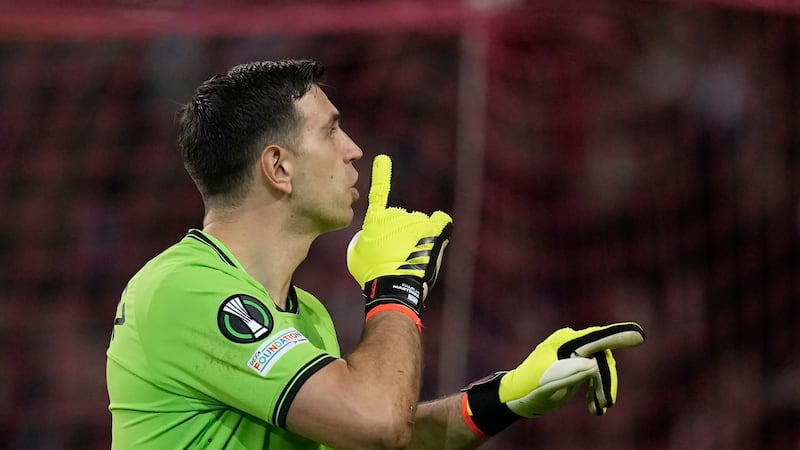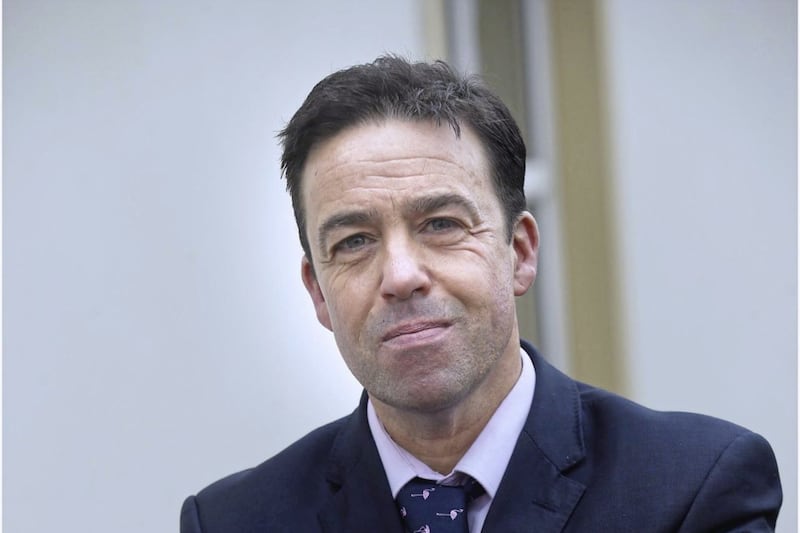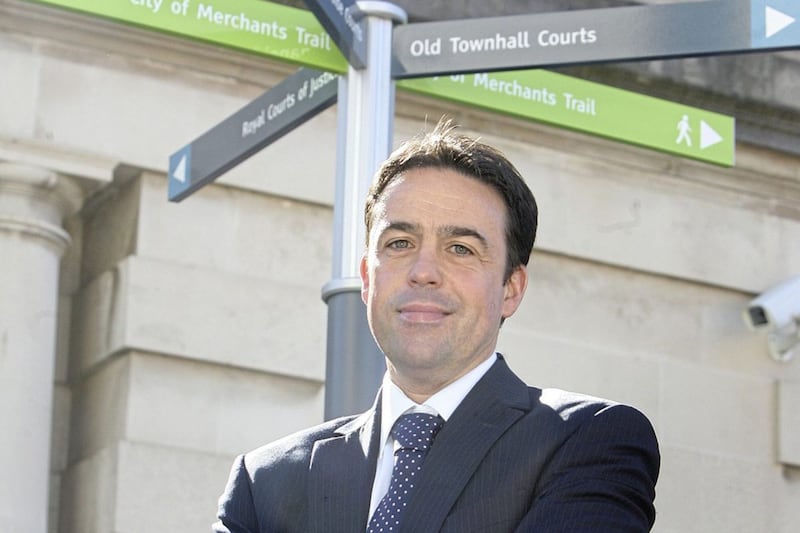STEPHEN Atherton’s Twitter profile is exactly what it says on the tin: ‘Survivor of Cumbernauld in the 80s. Father of five loveable rogues. Fighting for Justice at John J McNally Solicitors.’
While all eyes and ears will be fixed on the Stormont Executive’s review of current restrictions later today - with the hope outdoor sports for children and young people will be given a return date - Atherton’s legal challenge against the enduring ban on play will be heard at Belfast’s High Court on Thursday.
It’s a case that could potentially have far-reaching implications on the lives of children more than an erratic COVID infection rate graph that has generally dictated terms for them over the past year.
We’ll return to the statutory rights of children, but first: who is the 51-year-old Glasgow-born solicitor who with ceaseless energy has been calling out the Department of Health and Executive members for the past five months for their handling of children during the pandemic?
“I was born a stone’s throw from Hampden Park,” Atherton explains.
“My parents were working class. I wouldn’t say we lived in poverty but the housing was poor. We moved to a new town called Cumbernauld when I was two-years-old. I’d a brother who died of meningitis just before I was born.
“There was a huge amount of infant mortality at that time. Back then, families got so many points to move to these places called new towns.
“Cumbernauld would be similar in structure to somewhere like Craigavon. From that point on, I was just like any other kid; I just wanted to be a footballer.
“I was down at Norwich as a schoolboy and then I signed schoolboy forms for Hearts. I did seven ‘O’ Levels and got very good marks in them, but I wanted to follow my dream and be a professional footballer.”
Between the ages of 16 and 18, Atherton, a midfield player, loved every minute of his time at Tyncastle.
However, two days before celebrating his 18th birthday, the-then Hearts manager Alex MacDonald called the youngster into his office and delivered the devastating news that he was being released by the club.
“I was told I was too small to make it as a professional footballer in the Scottish League. In professional terms, that was a death sentence for me because at that time they weren’t saying you’re not good enough.
"With the benefit of hindsight, it might have been his way of letting me down gently. I don’t know, I’ll never know that, but Alex MacDonald was somebody I had huge respect for – an ex-Rangers player – and he was telling me: ‘You’re too small.’”
Atherton left Hearts and never kicked a ball again.
“I labelled myself a failure. I felt my identity was always as a footballer – and that was gone.
“After I left Hearts, I often asked myself: ‘Who am I? What am I?’”
Between the ages of 18 and 26, Atherton’s life meandered and career expectations were firmly kept in check.
He got a job in a builder's merchants.
"From playing on the grass every day I found myself carrying gas bottles and that sort of thing. I started selling cash registers until I was about 25.
“One time we became involved in a legal wrangle and a letter came in and I was asked to read it. I couldn’t understand the language of it, and I remember thinking: ‘Jeez, I used to have half a brain.’
“It triggered me to go back to education.”
In 1997, he rolled the dice and went off to study law.
He looked at London, Manchester and Dublin before settling on Belfast.
“Rangers had just won nine-in-a-row so I don’t know how much of a motivation their pending 10-in-a-row had on me," laughs Atherton, a Celtic season ticket-holder, "but with impeccable timing I went to Belfast.
“I thought it was the place to get away and focus. I came over here, went to Castlereagh College for a year, stayed in The Moy in Tyrone, worked in a bar. I did my access course for Queen’s and met my wife there, who’s from Maghery. We started a family. In 2003, I joined John J McNally Solicitors and I’ve been there ever since.”
From they were knee-high, his sons have been playing Gaelic football and soccer for Maghery and Glenavon, respectively.
Someone at the Mourneview Academy heard he’d played a bit of football in his youth and, like many parents, Atherton was thrown a club tracksuit and asked to help out.
His youngest son, Christopher, plays on the same U14 team as the son of Glenavon senior manager Gary Hamilton, who has also been a steadfast campaigner for children to get back playing outdoor sport.
“I’ve huge respect for Glenavon Football Club,” Atherton says.
“They are a genuine, cross-community club who give children a chance and place children at the very heart of their club. Gary Hamilton goes to nearly every academy meeting. I’ve tremendous respect for Gary.
“He takes such a strong interest in the young players because it’s so pivotal and important to him.”
Having pursued another degree in sports law, Atherton was invited to sit on the Irish FA’s disciplinary committee in January 2018.
Life was good. His kids loved their sports and the entire family became weaved into the fabric of Glenavon.
Last March, however, the entire planet was hit by an invisible tsunami called COVID19 with lockdowns soon to become an accepted feature of modern life.
Two of his own children, Odhran and Lauren, suffer from asthma and were shielding, with Lauren hospitalised last September with respiratory issues.
Following the last closure of outdoor sports back in mid-October, more people have begun to question the merit in denying children the opportunity to play and interact with their friends, especially with seemingly every virologist and public health expert agreeing that the rates of transmission of the disease outdoors is exceptionally low, particularly among children.
With a burning sense of rage and injustice, the Magherafelt-based solicitor’s name began popping up on social media, in newspaper columns, various podcasts and television.
Atherton’s articulacy and passion have been his twin weapons in battling to end what he and indeed many people regard as the ongoing ‘house arrest’ of young people, while at the same time reminding government and, in particular, the Minister for Health, of their statutory duties to protect the rights and welfare of children.
The constant refrain from Minister Robin Swann and his scientific advisers has been for citizens to heed the ‘stay at home’ message in order to reduce positive case numbers and hospital admissions.
In November, Atherton quit his voluntary role on the Irish FA’s disciplinary committee in protest after failing to garner their support to return children back to the football pitch in a safe, feasible manner.
The GAA has also come in for some fierce criticism for their perceived failure to get children back onto a field.
It is estimated children have lost nine out of the last 12 months playing their sport despite low rates of transmission in an outdoor setting with mitigations in place.
The GAA insist it has followed government guidelines at all times.
While studying remotely for a degree in sports law out of Sheffield Hallam University, Atherton completed a dissertation on the rights of children.
“It was because of that dissertation I was so alive to the United Nations Convention on the Rights of the Child (UNCRC), otherwise it probably would have sailed past me.
“I would have thought it was an injustice that kids weren’t playing football but, call it luck or fate, when children’s sport was criminalised – because that’s what it is – I knew instinctively that children have a right to play, they have a right for their voice to be heard.”
Scotland is in the process of incorporating the UNCRC into domestic law while here, the Northern Ireland Commissioner for Children and Young People has called for government to do likewise.
Regardless of the outcome of his legal challenge, Atherton wants a public enquiry into the handling of the pandemic and how children's lives have been severely impacted.
“I’ll be calling for the United Nations Convention on the Rights of the Child to be incorporated into domestic law here which will help protect children in the future.
“My life’s purpose after this, apart from my own children, is ensuring that the next generation of children never experience what this generation of children have experienced this past year. This can never happen again.”
“Any time you go to close a school; any time you go to close a playground we need to look at what effect that’s going to have on children. We need to give children a voice. That’s a huge part of the United Nations Convention on the Rights of the Child – and throughout this pandemic, children haven’t had a voice. They have been silence, marginalised and put to the side.”
Atherton also feels the northern society’s checks and balances on government have been weak and has criticised sections of the media for not scrutinising key decisions that affect the lives of children with more vigour.
With the Northern Ireland Executive continuing to take direction from the Department of Health, they appear poised to loosen the ban on outdoor sports for children later today and are expected to also give firmer details of a return to school for older children.
As the Department of Health tries to safely navigate its way out of the current lockdown, a growing number of people feel that children have suffered the worst accesses of this pandemic.
What price do you put on a lost year of childhood?
It seems Stephen Atherton’s fight is only beginning.
“I always identified myself as a footballer in school. It was your identity. What’s happened to so many children and young people is the deconstruction of their identity. Unfortunately, you can’t put that into any pleadings.”
